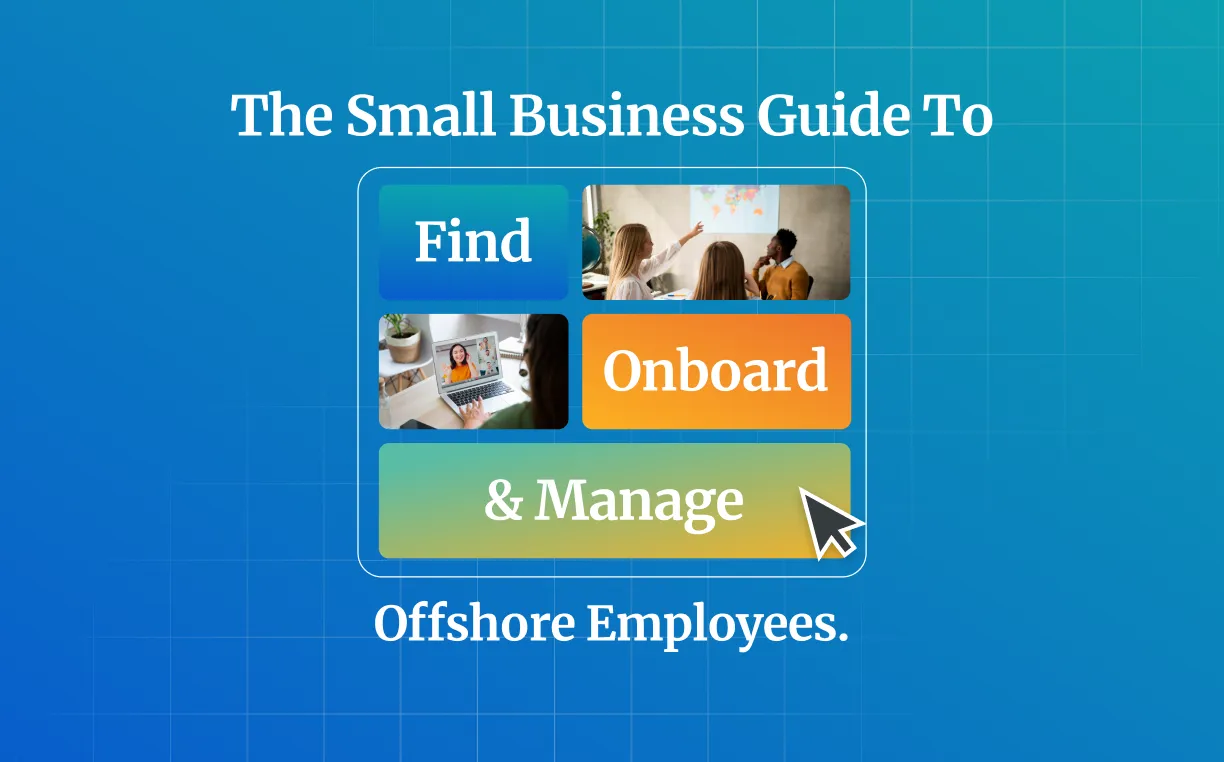Fire Your Inner Bookkeeper: Offshore Bookkeeping for the Busy Business Owner
Key Takeaways:
- Bookkeeping mistakes cost time, money, and peace of mind.
- Warning signs include constant delays, frequent errors, and unclear profitability.
- Delegating bookkeeping is a promotion, not a loss of control.
- The Find–Onboard–Manage process ensures smooth transitions and long-term success.
Why did the small business owner break up with QuickBooks? It kept bringing up old issues every month. And, like any bad ex, it made them pay for it. Just ask the owner of Chachi’s Mexican Restaurant in Las Cruces, NM, who had to pay $45,700 in back wages after what he called a “very simple bookkeeping error”, a mistake that made headlines and prompted him to hire an outside firm to prevent it from happening again (CBS4 News).
Many business owners unwittingly hire an underqualified, overworked, and frankly insubordinate employee for their bookkeeping: themselves. Some of the QuickBooks cleanup horror stories on social media are both traumatizing and tragic. Otherwise savvy entrepreneurs make what a rookie bookkeeper would call a basic error. If you’re staying up late squinting at spreadsheets, cramming receipts into envelopes, or convincing yourself you’ll “catch up next weekend,” you should probably fire yourself.
The reality is simple: every hour spent wrestling with your own books is an hour stolen from growth, innovation, and peace of mind. This guide will show you how to recognize when your bookkeeping role has become a liability, and how to replace it with a smarter, more profitable approach through skilled offshore bookkeeping talent..
Signs It’s Time to Let Go of DIY Bookkeeping
Bookkeeping headaches rarely start with one dramatic mistake. More often, they creep in through small, repeated errors — each one quietly draining profits, causing tax-time stress, and clouding the owner’s view of their own finances. It is no wonder that 68% of small business owners name bookkeeping as their most dreaded task and as many as 80% feel stressed over the tax season (Fundbox). The truth is that these errors follow predictable patterns, and recognizing them is the first step toward deciding whether it is time to let go of the books for good.
One of the biggest red flags in DIY bookkeeping is disorganization. Mixing personal and business finances, skipping regular bank reconciliations, and failing to keep proper records may seem like small oversights, but they quickly snowball into major headaches. Commingled accounts create tax and legal risks, unreconciled statements allow small errors and fraud to go unnoticed, and missing receipts mean lost deductions and higher stress at tax time. A professional bookkeeper brings structure, ensuring every transaction is documented, every account balanced, and every expense substantiated.
Equally damaging are compliance and classification mistakes. Misclassifying income or expenses can distort profit reports, increase tax liability, and even trigger audits, while errors in payroll or employee classification can result in penalties, lawsuits, and back taxes. These are not just paperwork problems, they can jeopardize the financial stability of a business. A trained bookkeeper understands the rules, ensures accurate categorization, and keeps payroll in full compliance, protecting both the company’s bottom line and its reputation.
When DIY Bookkeeping Stops Making Sense
The key signs it's time to call in a pro:
- Books never fully up-to-date
- Reconciliation takes hours
- Missed deadlines or errors
Knowing the most common bookkeeping mistakes is only part of the picture. The real danger lies in how easily these errors can creep into your daily operations without you realizing it. That is where the warning signs come in, the patterns and red flags that reveal your bookkeeping role has become a liability. Recognizing these early can mean the difference between fixing small problems and facing costly, business-threatening consequences.
Key Warning Signs You Need a Bookkeeper
- Spending too much time on bookkeeping: If you’re losing hours that should go to sales or operations, you’re paying a hidden cost in lost opportunities. In fact, the research shows 40% of small business owners spend over 80 hours a year on bookkeeping — two full work weeks.
- Frequent errors or missing transactions: Disorganized books lead to missed deductions, late fees, and financial blind spots. Studies note that 27% of small businesses have experienced cash flow problems directly tied to inaccurate records.
- The books are always behind: Out-of-date records mean flying blind on cash flow and performance. According to the report, 34% of owners admit their books are more than a month out of date at any given time.
- Tax season chaos: Scrambling for receipts and records is a clear sign of inadequate year-round bookkeeping. The research found that 47% of small business owners feel unprepared at tax time due to poor recordkeeping.
- Unclear finances despite growing revenue: Not knowing where your money goes is a profit killer. Nearly 1 in 3 owners say they don’t fully understand their profitability despite increasing sales.
For many entrepreneurs, doing their own books starts as a badge of honor — proof that you can handle everything yourself. But as explored in The Delegation Journey of a New Business Owner, that same habit can quietly become a growth-killer. In that article, we highlighted how the hours spent reconciling accounts or chasing receipts are hours diverted from strategy, innovation, and leadership. Over time, allowing habitual self-reliance to rule your time becomes less about pride and more about limiting your business’s potential. Like I said, you should probably fire your inner bookkeeper.
How to Fire Yourself Gracefully
You could hire a local bookkeeper, but doing so limits your search to a small, often oversaturated talent pool. As argued in detail in a 2025 bookkeeping and accounting strategy article, hiring abroad opens the door to skilled professionals who can match your business rhythms, integrate seamlessly with your systems, and bring fresh operational perspectives shaped by diverse markets. It is not just about where your bookkeeper sits — it is about finding the right fit for how your business works today and where it needs to go next.
Beyond cutting costs, outsourcing offshore is about unlocking greater value for your business. As recently as 2022, surveys found that 70% of businesses cited cost savings as their primary reason for outsourcing. However, the latest data from Deloitte in 2024 shows that priorities have shifted. Today, more organizations are turning to outsourcing for the strategic advantages it offers: improved access to specialized talent (42%), higher quality and performance (33%), and the ability to adapt quickly to changing market demands (35%). These shifts reveal that leaders increasingly see outsourcing not as a stopgap expense-reduction measure, but as a way to strengthen capabilities, drive innovation, and keep their operations competitive. The question, then, is how to make that shift effectively and that begins with a few key steps any business can follow.
Step 1 — Finding the right offshore bookkeeper
Write the job description your inner bookkeeper could never pass. Getting the right person starts with defining the role in a way that weeds out mediocrity before it ever lands in your inbox. At AbroadWorks, the Find process covers everything from targeted job postings to resume screening and role-specific skills tests that ensure candidates are more than just “good with numbers.” This upfront diligence means you are not just hiring a bookkeeper — you are securing a long-term asset for your business.
Step 2 — Onboarding without tears
The best hire in the world can still fail without the right start. AbroadWorks’ Onboard process handles the details that often derail offshore hiring: regional compliance, legally sound contracts, benefits administration, and background checks. Done right, onboarding turns a new hire into a productive team member in days, not weeks. And with offshore hiring delivering an average of 60 to 70 percent labor cost savings, a smooth start means you begin reaping those gains almost immediately.
Step 3 — Managing like a boss
Hiring offshore is only the first chapter; how you manage makes the difference between a good hire and a game-changer. AbroadWorks’ Manage process uses productivity tracking, payroll automation, and enterprise-grade security to keep offshore teams efficient and accountable. With the global outsourcing market projected to reach $56.4 billion by 2027, the leaders who succeed will be those who treat their remote talent as a core part of the business.
Life After Your Inner Bookkeeper
Picture the post-firing glow-up: your books are clean, tax season arrives without dread, and your evenings are freed for business growth — or guilt-free Netflix marathons. Outsourcing your bookkeeping to an offshore accountant is not just about getting the numbers right; it is about getting your life back. With the right offshore partner, you trade late-night receipt sorting for peace of mind, predictable processes, and the mental bandwidth to focus on what really matters. AbroadWorks is ready to help you take that first step toward reclaiming your time and your sanity.
Also Read:
Why Offshore Bookkeeping and Accounting Makes Strategic Sense in 2025
Sources
- Deloitte Global Outsourcing Survey 2024 – Trends in outsourcing motivations, showing a shift from cost savings to strategic value drivers like talent access and performance improvement. https://www2.deloitte.com/global/en/pages/operations/articles/global-outsourcing-survey.html
- Global Outsourcing Market Forecast – Projection of the outsourcing industry reaching $56.4 billion by 2027. https://www.grandviewresearch.com/industry-analysis/business-process-outsourcing-bpo-market
- CBS4 News – The owner of Chachi’s Mexican Restaurant in Las Cruces is responding after the U.S. Department of Labor found that he did not pay 22 workers proper overtime, totalling $45,700. https://cbs4local.com/news/local/owner-of-chachis-mexican-restaurants-responds-to-not-paying-employees-proper-overtime
- Fundbox – 2023 Tax Season Is Over. Now What? – Practical guidance for post-tax-day planning, showing small business owners spend an average of 23 hours filing taxes and how proactive systems can ease the burden. https://fundbox.com/blog/2023-tax-season-is-over-now-what/






